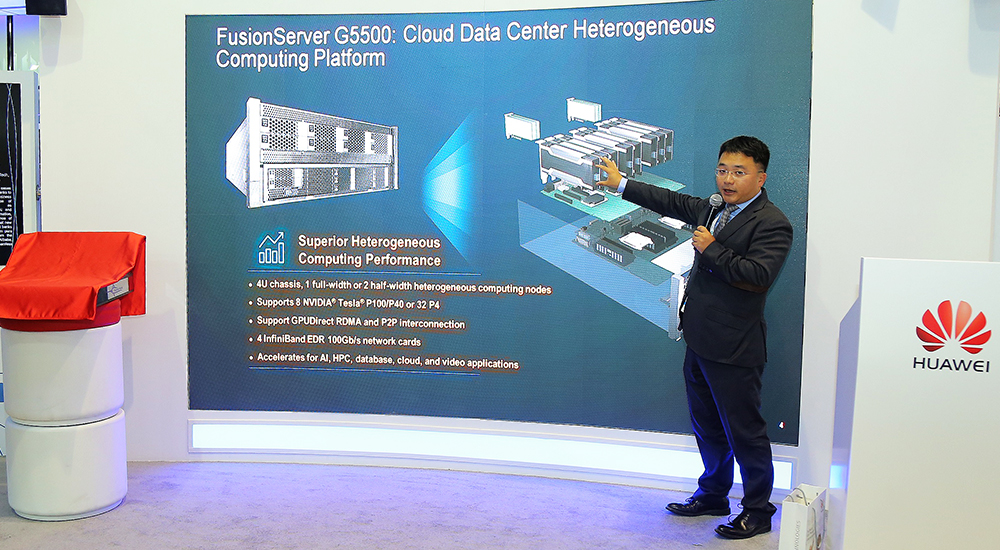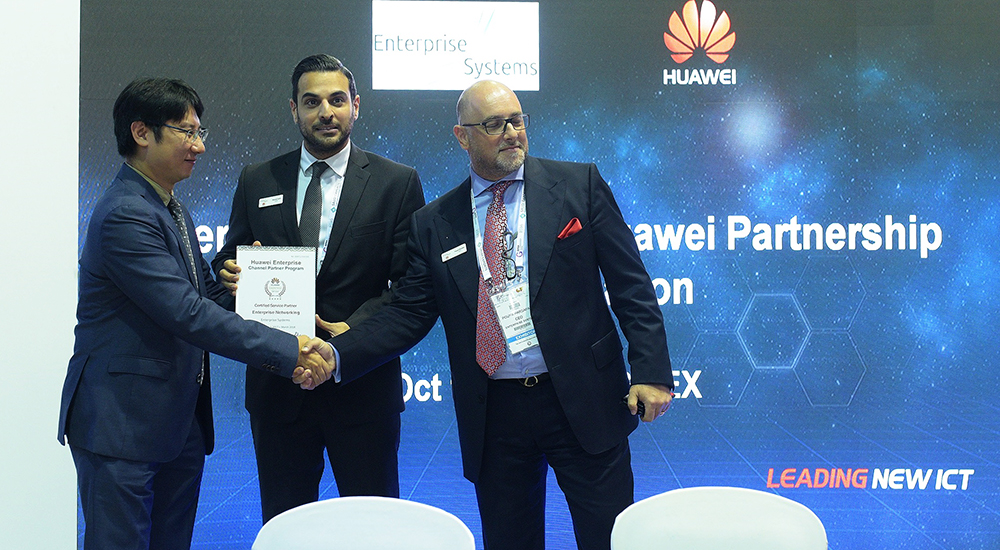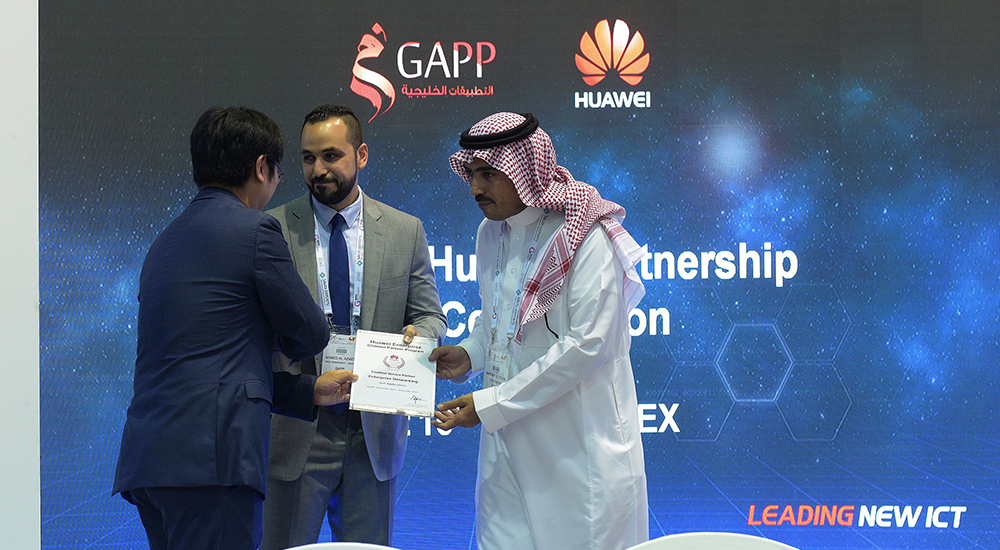Huawei announced its enterprise services strategy with the introduction of several channel services policies and programmes at Gitex 2017. The new strategy will focus on constructing a comprehensive cloud-based services ecosystem for its Middle East customers. This will help accelerate the shift to the cloud by industries, build a corresponding service ecosystem, develop the needed talent in cloud technology, and lead the service channel transformation through a network of multinational service partners.
Huawei will be transforming its cloud-based services to provide its Middle East customers with a comprehensive, one-stop experience with Real-time, On-demand, All-online, DIY, Social, or ROADS. This new cloud transformation service helps customers during the entire process of their operations, from initial assessment to planning and design, migration, disaster recovery, security and optimisation. The new service has been developed based on Huawei’s experience building over 400 cloud datacentres and over 100 cloud migration projects.
In support of this global digital service platform, Huawei is making significant investments to construct a cloud-based tools platform that will deliver remote automated services. This increasingly comprehensive offering of services and solutions is being developed by utilising Huawei’s extensive partner network, including strategic relationships with regional companies such as the UAE’s Enterprise Systems, Saudi Arabia’s Gulf Applications, and the pan-GCC Redington Gulf.
Huawei has among the most comprehensive services capabilities in the world, with more than 2,400 Certified Service Partners CSPs worldwide and more than 60 CSPs in Middle East.
Huawei is also building labs where deployment methodologies can be verified and improved together with both customers and partners. Every industry scenario has its own unique characteristics, which is why Huawei is developing services that are tailored for specific vertical sectors. Through the utilisation of Huawei’s new Smart Network Operation Service, customers will be enabled to build their intelligent O&M capabilities.
Huawei also launched a cloud certification programme at Gitex 2017 in order to develop the cloud ecosystem’s talent pool in the Middle East. This includes training and certifications that meet the needs of specific industries, with unique, tailored programmes for each sector.
“Enterprises and governments are enthusiastically embracing advanced, comprehensive cloud services because of the significant benefits they provide. This includes a one-stop service from initiation to fully operational. To realise the benefits, many decisions need to be made before, during and after the cloud transition begins. Huawei is offering a cloud transformation service that helps our customers in the Middle East throughout the entire process, from initial assessment to planning and design, migration, disaster recovery, security and optimisation,” said Alaa ElShimy, Vice President and Managing Director, Huawei Enterprise Middle East.
Boundless Computing
Huawei also unveiled its Boundless Computing server strategy to drive digital transformation for the Middle East’s businesses. As part of the announcement, Huawei demonstrated two technologies: FusionServer V5, and the Atlas intelligent cloud hardware platform. The former, powered by Intel Skylake processors is debuting in the region.
Boundless Computing is Huawei’s answer to ensuring new smarter and more connected next-gen technologies are given the infrastructure and high-power support they need to be always-on, always-secure. This type of computing aims to bring hardware closer to data sources and reduce the need for additional layers of overlying software.
It also includes pushing beyond the boundary of servers, and enabling DC-level resource pooling and on-demand provisioning. Moreover, it requires going beyond the boundary of datacentres, enabling smart access, and taking computing even into the data sources, in this way, to smarten up data at the remote end.
Atlas was introduced as a way of utilising Artificial Intelligence for High Power Computing. As the result of Huawei’s Boundless Computing strategy, the Atlas platform positions Huawei to prepare the infrastructure resource pool for the digital revolution.
Huawei’s FusionServer V5, is an integral part of the new strategy, as it delivers smart features such as: big data application acceleration solution, all-flash SAP HANA appliance solution, G series heterogeneous computing platforms, and edge computing for smart video analytics solution. These integrated solutions will help businesses in the region boost the overall computing efficiency of their datacentres.
“In this region, the businesses that succeed with digital transformation are the ones that invent better ways of serving their customers, which today is being driven by Artificial Intelligence and heterogeneous computing,” commented ElShimy.
“The release of our boundless computing server strategy and series solutions empowers our clients to be a creative force in their industry, bringing new value through efficient, smarter computing,” he added.
With the rise of artificial intelligence, cloud computing technologies will be integral to people’s daily lives. From applications such as safe city and smart manufacturing to autonomous driving, artificial intelligence and cloud technologies are spreading. Meanwhile, pivotal to intelligence is having capabilities that allow numerous systems to process in real time the massive volumes of data generated from a world of full connectivity.
For example, a city with 100,000 cameras installed can produce 100 billion car plate records and 1 trillion facial recognition records a year. It has become a tremendous challenge for traditional computing systems to deliver the required capabilities in order to process, query, and analyse data of such magnitude.
The Atlas platform released by Huawei addresses the data processing challenges in the artificial intelligence era. The Atlas platform is based on Huawei’s FusionServer G series heterogeneous servers. The FusionServer G series leverages technologies such as heterogeneous resource pooling and intelligent orchestration to pool resources, and provisions hardware resources on demand to suit the needs of specific service models.
“The artificial intelligence era brings with it huge demands on existing infrastructure that cannot be met by traditional hardware. Atlas is a new-generation intelligent cloud hardware platform that takes resource utilisation and performance to new levels using pioneering technologies. Huawei has been inspired by the idea of making computing simple through continuous innovation, and keeps customers’ requirements in mind to build servers that are stable, reliable, and high-performing, to help customers better cope with the challenges for successful transformation in the artificial intelligence and cloud era,” said Li Huan, Vice President of Strategy Marketing, Huawei Middle East.
Huawei’s Boundless Computing strategy advocates innovations around computing and leverages innovative chips, heterogeneous computing, and edge computing in order to push the traditional computing boundaries that used to be confined to CPUs, servers, and datacentres.





